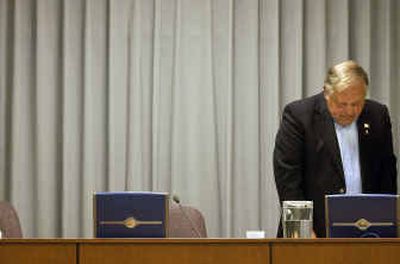Election decisions

It’s barely 2 years old, but election time is already here for the city of Spokane Valley. For the incumbents, it’s been two years of long hours, countless meetings and the nonstop learning required to create a city from scratch. With all seven council seats up for grabs, the incumbents and potential challengers are beginning to mull over whether to run.
“How do you get someone to sign up for something for which you are underpaid, overcriticized and work an immense number of hours?” mused Councilman Dick Denenny, who has yet to decide whether he will run again.
For him it was the chance to be a part of his community’s history and the excitement of setting up the city and its direction for the future. Seeing how that planning progresses and how the city will implement its comprehensive land-use plan he helped craft are probably the most enticing reasons for running again.
“I just want this community to prosper,” he said.
But, as other public servants can confirm, working toward that prosperity comes at a cost.
“I’m in a sales environment,” said Denenny, who owns an employee benefits insurance consulting firm. “I’ve actually seen my income drop.”
Running for the position is expensive. According to data from the Washington Public Disclosure Commission, the winning candidates for the Spokane Valley City Council spent an average of $7,900 on their campaigns.
“That’s always the hard part – asking for money,” said Mayor Diana Wilhite. Her campaign cost about $7,300.
“I just went out and let people know I was running,” she said. One of the touching aspects of campaigning, she said, was people’s willingness to open up their checkbooks for her.
She mentioned that she was running to someone at a business conference who served on a city council in California. The woman, unprompted, whipped out her checkbook and said, ” ‘You’re going to need money. I’m writing you a check,’ ” Wilhite said.
In another case, she said an associate she hadn’t talked to for two years heard she was running and sent her money.
Once someone accepts a contribution, announces publicly that they are running, spends money for a campaign or reserves advertising for a campaign, he officially becomes a candidate in the eyes of the Public Disclosure Commission. It records the financial dealings and spending on most campaigns across the state, and all candidates are required to submit weekly donation reports starting July 1.
As of Wednesday afternoon, Councilmen Richard Munson and Mike DeVleming were the only people who have sent reports to the commission.
DeVleming said he hasn’t decided whether to go ahead with a second campaign, but he filed to make sure he was within the regulations as he starts to talk with people in the community.
“The people who run against us are going to have that age-old problem of running against an incumbent – name recognition,” Munson said. He repeated what others on the council had said – that the biggest challenge in a campaign is getting a candidate and his or her ideas in front of the voters.
“The winners are the ones who get out there and pound the pavement and knock on doors,” he said.
“What that really means is being accessible. If you’re not accessible, you shouldn’t be doing the job.”
But with an intensive campaign, reports to file, ads to purchase and mailings to write, the process can be overwhelming for seasoned politicians and novices alike. This year, the Spokane Valley Chamber of Commerce will hold a candidate school to help anyone looking into running for a council position.
“I think one of the biggest questions will be what you have to do before you actually file,” said Eldonna Gossett, chamber’s president. The class will meet June 15 at the Chamber of Commerce Business Center.
Sponsorship from Avista Utilities, the chamber and the $20 registration fees will pay for the course, which will include an informational packet, Gossett said.
Former candidates are quick to point out that a political race is usually more fun than the paperwork would let on.
“I love meeting people; I thought it was fun talking to people,” Wilhite said. “I wouldn’t have run for the office if I thought any part of it was going to be a chore.”
Councilman Steve Taylor said he spent 35 to 40 hours a week on his campaign, which cost more than $11,000.
“When I saw that the Valley was going to incorporate, I thought it was great. I felt that it was a wonderful opportunity to get involved directly in public service,” Taylor said.
“No one knew what to expect,” he said of the new council. He said that during the last election, one of the biggest challenges was that voters expected the candidates to know everything about every political issue.
“In hindsight now, we didn’t know anything,” he said.
That hindsight comes from two years of spending 15 to 20 hours per week on the council reading up on issues and listening to testimony from residents and the advice of the city’s legal, engineering and other staffs.
“It’s a real time commitment; you have to be aware of it,” Wilhite said. “I try not to add it up because I’d scare myself.”
Deputy Mayor Munson said he spends about 60 hours a week on council business, and other members said they regularly log 20 hours or more, depending on the week.
That breaks down to between $2 and $5 an hour, based on council members’ salary of $400 per month and the mayor’s of $500 per month, unless voters approve a pay increase in November.
Either way, council members don’t list the pay as the reason they chose to run.
“I’m just happy that I had the opportunity to do this,” Munson said.
“I’m going to let voters tell me whether they think I did a good job or not.”